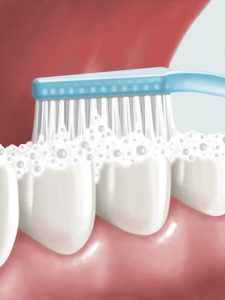Tooth Cleaning and Gum Disease
Proper dental cleaning is important for your oral health. Even when you brush and floss your teeth regularly, tartar can build up. Tooth cleaning by a dental hygienist will ensure that no plaque, tartar or stains on the teeth.
Most dentists recommend that you have your teeth professionally cleaned every six months. Dental cleaning provides many benefits, such as:
- preventing gum and periodontal disease
- preventing tooth loss
- freshening your breath
- brightening your smile

Deep cleaning
Deep cleaning is a procedure used by your dentist to treat gum and periodontal disease. When a patient has not had regular tooth cleaning, they might require deep cleaning.
Do I need deep cleaning?
Your dentist will be able to determine whether you need a deep cleaning. They use an instrument called a probe to measure the area around your teeth for any pocketing. Pockets are spaces between your teeth and gums. When the pockets are at least five millimeters deep, bacteria is able to hide within them. This eventually leads to gum disease.
Healthy pockets are around 3 millimeters wide. If your pockets are five millimeters deep or more, your dentist will likely prescribe deep scaling and root planning.
What is the deep cleaning process?
A basic tooth cleaning procedure involves removing plaque and tartar above and below the gum line. This is sometimes referred to as scaling. Deep cleaning involves the same scaling process, as well as root planning.
Root planning is the cleaning of the root surfaces. Besides removing tartar and plaque, it smooths the out the root’s rough spots. The bacteria that tends to collect within these spots contribute to gum disease.
Root planing may take one to two hours, though you would require several clinic visits.
After the deep cleaning
For a few days after the cleaning, it is normal to experience some soreness and sensitivity. You might also experience light bleeding. You may talk to your dentist if you feel great discomfort.
It is important that you receive regular dental cleanings. This will prevent another deep cleaning and serious gum disease. Additionally, you must brush your teeth twice a day and floss once daily.

